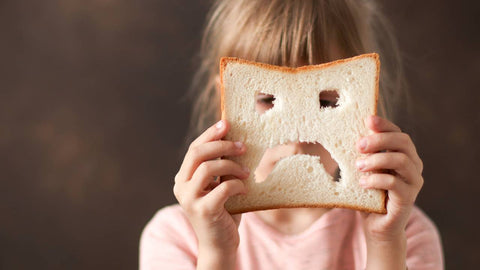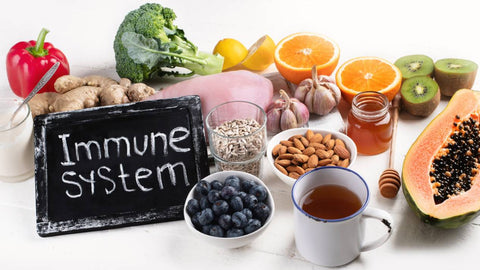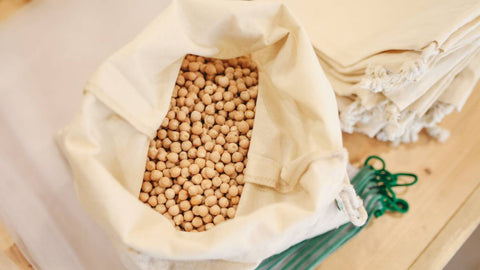Coeliac awareness week runs from the 13th to the 20th of March. Did you know 1 in 70 Aussies are estimated to have Coeliac disease, yet roughly 4 in 5 don’t even know they’ve got it? Getting diagnosed early is important for reducing the risk of long-term health complications. Find out more about Coeliac disease in this week's blog with our resident dietitian Nicole Saliba from Eatsense.
What is Coeliac disease?
Coeliac disease is a condition where the body’s immune system reacts abnormally to gluten, a protein found in wheat, rye, barley and oats. This immune response causes damage to the small bowel.The teeny tiny finger-like projections in your bowel called villi become inflamed and flattened. This causes issues with nutrient absorption. Coeliac disease can develop at ANY age and affects both men and women. You must be born with a genetic predisposition to develop it which is why its important to get tested if a family member is diagnosed. A first degree relative (parent, sibling, child) of someone with coeliac disease has about a 10% chance of also having the disease. Different environmental factors can trigger Coeliac disease at any stage throughout a person’s life.
How is Coeliac disease managed?
There is no cure for Coeliac disease. A strict, lifelong gluten free diet is currently the only medical treatment for coeliac disease. By removing gluten, the small bowel lining is able to heal and symptoms can resolve.
What are the symptoms of Coeliac disease?
Symptoms of coeliac disease vary a lot between people. Some people will have severe symptoms where some people have no symptoms at all! The severity of your symptoms is not a good indicator of how inflamed your bowel is! Symptoms can include one or more of the following:
- Persistent gut symptoms such as diarrhoea, constipation, nausea, vomiting, flatulence, cramping, bloating, abdominal pain
- Fatigue, weakness and low energy
- Iron deficiency anaemia and/or other vitamin and mineral deficiencies
- Failure to thrive or delayed puberty in children
- Unexplained weight loss
- Severe or recurrent mouth ulcers
- Skin rashes
How is Coeliac disease diagnosed?
It is important you do not cut out gluten before getting properly screened and diagnosed.
If you follow a gluten free diet before you have been properly diagnosed, the tests used to diagnose coeliac disease are unreliable, and can be falsely negative. Provided you are still consuming enough gluten you are usually screened first with a blood test. A blood test is NOT enough to be diagnosed. It needs to be followed by a small bowel biopsy to confirm the diagnosis which is a simple day procedure done by a specialist.
What should you do after getting diagnosed?
- Make an appointment with an Accredited Practising Dietitian who specialises in coeliac disease such as the dietitians at Eatsense
- You should start your gluten free diet immediately. Begin by purchasing products that are labelled ‘Gluten Free’, as well as foods that are naturally gluten free and ones your dietitian has advised are safe
- Make an appointment with your GP to test for any vitamin or mineral deficiencies and associated conditions
- All adults diagnosed with coeliac disease should have a bone density scan to check for osteopaenia or osteoporosis. Those with medically diagnosed coeliac disease are entitled to a Medicare rebate for a bone density scan every two years.
- Ask your GP for a thorough blood test to check things like electrolytes, thyroid function and screening for other autoimmune conditions. Deficiencies in newly diagnosed and untreated coeliac disease can include iron, calcium, phosphate, vitamin D, zinc, vitamin B12, folate, magnesium. Supplementation may initially be required to correct any deficiencies and this should be guided by your doctor, specialist or dietitian
What can you eat on a gluten-free diet?
Currently, the only treatment for coeliac disease is a strict, lifelong gluten free diet. Gluten is a protein found in wheat, rye, barley and oats. So you must avoid any foods containing these ingredients such as wheat pasta, wheat/ordinary bread, wheat containing cereals etc.
You can eat foods that are:
- Naturally gluten free: fresh fruit and vegetables, meat, fish, chicken, eggs, nuts, legumes, milk, fats, oils and gluten free grains such as rice, corn, quinoa, buckwheat
- Foods that are labelled gluten-free or suitable by ingredient
 A day of gluten-free eating may look like;
A day of gluten-free eating may look like;
Brekky
- Rice porridge or gluten-free muesli or granola with milk
- Omelette with vegetables, cheese and gluten-free toast
- Smoothie with fruit, milk, yoghurt, honey
- Activate Foods breakfast frittata
Lunch
- Rice paper rolls with chicken/prawns/tofu & veggies
- Gluten-free wrap with salad and meat
- Fried rice with vegetables, chicken and gluten-free soy sauce
- Sushi with gluten free soy sauce (make sure sushi rice is gluten-free too)
- Buckwheat crackers with avocado and tuna
- Rice noodle salad with tofu/chicken/prawns and veggies
- Activate Foods meal
 Dinner
Dinner
- Meat, fish, chicken, eggs, tofu, legumes, prawns
- Vegetables or salad
- Rice, rice noodles, gluten-free gnocchi, potato/sweet potato, corn tortilla, corn chips, taco shells, rice noodles, gluten-free pasta, quinoa or buckwheat
- Activate Foods meal
Interested in learning more or need help with managing your Coeliac disease? Book in with an EatSense dietitian today online at eatsense.com.au!
Also, if you are located on the Central Coast, Newcastle or Sydney we offer gluten free premade meal delivery. You can view our gluten free range here.


